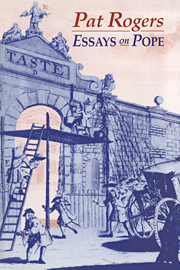Book contents
- Frontmatter
- Contents
- Preface
- Acknowledgements
- List of abbreviations
- 1 Pope and the syntax of satire
- 2 The politics of style
- 3 Form and pattern in the Pastorals
- 4 Windsor-Forest, Britannia and river poetry
- 5 Faery lore and The Rape of the Lock
- 6 Timon's Villa and Chatsworth
- 7 A drama of mixed feelings: the Epistle to Arbuthnot
- 8 The name and nature of Dulness: proper nouns in The Dunciad
- 9 Pope and the social scene
- 10 Blacks and poetry and Pope
- 11 The case of Pope v. Curll
- 12 Pope and his subscribers
- 13 The Burlington circle in the provinces: Pope's Yorkshire friends
- 14 Pope and the antiquarians
- Index
2 - The politics of style
Published online by Cambridge University Press: 18 December 2009
- Frontmatter
- Contents
- Preface
- Acknowledgements
- List of abbreviations
- 1 Pope and the syntax of satire
- 2 The politics of style
- 3 Form and pattern in the Pastorals
- 4 Windsor-Forest, Britannia and river poetry
- 5 Faery lore and The Rape of the Lock
- 6 Timon's Villa and Chatsworth
- 7 A drama of mixed feelings: the Epistle to Arbuthnot
- 8 The name and nature of Dulness: proper nouns in The Dunciad
- 9 Pope and the social scene
- 10 Blacks and poetry and Pope
- 11 The case of Pope v. Curll
- 12 Pope and his subscribers
- 13 The Burlington circle in the provinces: Pope's Yorkshire friends
- 14 Pope and the antiquarians
- Index
Summary
From his earliest years Pope set himself to introduce a new ‘correctness’ to English poetry. It seems an odd ambition to us; and not merely because it implies a censorious attitude towards the ‘irregular’ beauties of Shakespeare and Milton. Beyond all this, we are ill at ease with an aesthetic which places such a high value on what seem to us aridly technical skills. But for the Augustans it was different. The new polish they looked for in art was a matter of glamour, pride, self-confidence. ‘Correct’ poetry was part of a swelling nationalism and a swaggering modernism; it came ready equipped with a justification in cultural history:
… Britain to soft refinements less a foe,
Wit grew polite, and Numbers learn'd to flow.
Waller was smooth; but Dryden taught to join
The varying verse, the full resounding line,
The long majestic march, and energy divine.
Tho' still some traces of our rustic vein
And splay-foot verse, remain'd, and will remain.
Late, very late, correctness grew our care,
When the tir'd nation breath'd from civil war.
Exact Racine, and Corneille's noble fire
Show'd us that France had something to admire.
Not but the Tragic spirit was our own,
And full in Shakespear, fair in Otway shone:
But Otway faiPd to polish or refine,
And fluent Shakespear scarce effac'd a line.
Ev'n copious Dryden, wanted or forgot,
The last and greatest Art, the Art to blot.
(Horace, Ep. II. i. 265–81)Note the precise distinctions drawn between Waller and Dryden, Racine and Corneille, Shakespeare and Otway. Always Pope is busy discriminating.
- Type
- Chapter
- Information
- Essays on Pope , pp. 27 - 36Publisher: Cambridge University PressPrint publication year: 1993

